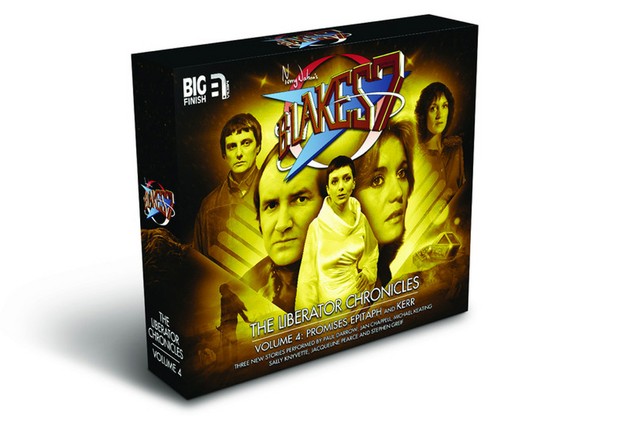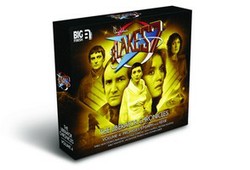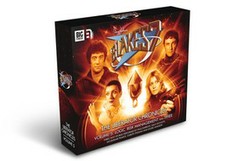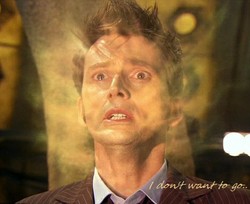Writers Nigel Fairs, Scott Harrison and Nick Wallace have produced three hour-long audio plays that make up volume four of Liberator Chronicles, the Big Finish series of Blake's Seven audio plays. Here, six of the original actors - Paul Darrow, Michael Keating, Jan Chappell, Sally Knyvette, Jacqueline Pearce and Stephen Greif - return to the their roles.

Blake’s 7: Review of Liberator Chronicles Volume Four
The fourth in the Big Finish series of Blake's Seven audio plays contains three stories pairing Cally and Travis, Jenna and Vila, and a clone of Avon with Servalan.
 Liberator Chronicles Volume Four Big Finish |
The fourth volume of Big Finish’s Liberator Chronicles Blake’s 7 audio dramas sees the return of Paul Darrow as Kerr Avon, Michael Keating as Vila Restal, Jan Chappell as Cally, Sally Knyvette as Jenna, Jacqueline Pearce as Servalan and Stephen Greif as Travis.
Big Finish has gone back to the format of three independent stories. Recorded at the Moat Studios in London, the three hour-long plays were directed by Lisa Bowerman and are set during the first season of the television series.
“Promises” by Nigel Fairs
Travis receives a message from an old acquaintance calling for a meeting on Saurian Minor, a rock close to Saurian Major where Blake’s crew destroyed the communications base in the first season episode “Time Squad”. This was the planet where we were first introduced to Cally and it turns out she has also been summed by the mysterious Scetona. Unsurprisingly, this is a trap and the two enemies realise they must work together if they are to survive and escape, but they trust each other not one jot. And who set the trap?
“Epitaph” by Scott Harrison
Jenna receives a distress call from an old smuggling friend and takes Vila along to help only to discover this was a trap set by her brother, whom she thought was dead. He wanted to join the Liberator crew and had a plan to attack Outpost 117, the top Federation information centre. When Jenna told him Blake wouldn’t go for it, he decided to do it himself with the reluctant help of Jenna and Vila. But it turned out the brother had been lying and he had a more personal reason for the mission.
“Kerr” by Nick Wallace
In the TV series, Servalan had clones of Blake made but in this she opts for the more interesting idea of a clone of Avon. But this was not for a plaything; she had other plans, though when she told the clone it had a service it could perform for her, one couldn’t help but wonder. The clone though soon developed much of Avon’s personalities and the bigger question that Servalan had to face was whether she could trust it, especially when it wanted to make contact with one of Avon’s partners in crime, who was by now living in a lunatic asylum.
Are they any good?
Travis’ ponderings in the early part of “Promises” did not ring true; it is hard to imagine the Travis we saw on screen going through such self analysis. That said, the story itself unravels itself nicely as we are treated to glimpses of Travis’ and Cally’s back stories and how both were affected dramatically by Scetona.
Jan Chappell too is much better in the role than she was in the second of the Liberator Chronicles series; she has obviously worked at getting her voice closer to what it was in the television series and thus comes across a lot more believable. She also had the best line: “Only the mad can see the world clearly.”
And on to “Epitaph”. The TV series did not really have enough Jenna and Vila interaction, which was a shame as, in the little they did, they bounced off each other so well. Even though the dialogue between them we got was welcome, there was not really enough. Too much of the story, and it wasn’t a bad story, was told as a monologue from Jenna. They only have two characters per story, they should really use both of them more.
Talking of interactions, the ones between Avon and Servalan were always intriguing, which is probably why these two have been paired together for the third story, even if it wasn’t really Avon. And it was such a pleasure to hear Jacqueline Pearce’s silky voice putting forward such evil intent. The story also captures well the underlying sexual tension between the two characters.
However, the criticism of “Epitaph” could equally be applied here, with too much monologue from Servalan and not enough interaction between her and the clone. It seems strange given they are going with this two-character pairing format that they are not using it to its best, especially given the potential with the three pairings they have here. That said, overall this is a good collection of three very different stories and all-in-all very enjoyable.
You might also like
Blake’s 7: Review of Liberator Chronicles Volume FiveThe fifth in the Big Finish series of Blake's Seven audio plays contains thre...
The Regeneration of Dr WhoAs long as he can keep regenerating, the Doctor can now live forever. But fo...





 KZine Issue 31: Review of October 2021 Issueon 11/07/2021
KZine Issue 31: Review of October 2021 Issueon 11/07/2021
 KZine Issue 30: Review of June 2021 Issueon 07/05/2021
KZine Issue 30: Review of June 2021 Issueon 07/05/2021
 KZine Issue 29: Review of February 2021 Issueon 02/23/2021
KZine Issue 29: Review of February 2021 Issueon 02/23/2021
 KZine Issue 28: Review of September 2020 Issueon 10/01/2020
KZine Issue 28: Review of September 2020 Issueon 10/01/2020



Comments
Your fourth subheading, Are they any good?, intriguingly notes that "Jan Chappell too is much better in the role than she was in the second of the Liberator Chronicles series; she has obviously worked at getting her voice closer to what it was in the television series and thus comes across a lot more believable."
Why was it that Chappell strayed from what worked vocally on the series?